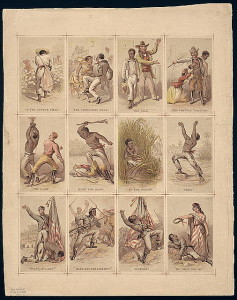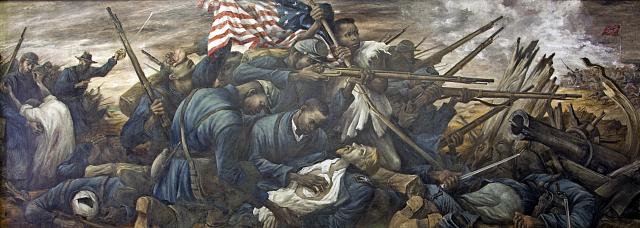As you can read at Civil War Daily Gazette, 150 years ago today the 54th Massachusetts , a regiment of black soldiers, led a failed assault on Battery Wagner at Charleston. An article published in the August 22, 1863 issue of Harper’s Weekly (at Son of the South) pointed out that black soldiers were living and dying proof that war could never again be a war to restore the old Union “as it was”. Here’s some of the piece:
“OUR BLACK ARMY.”
A CALM, elaborate, and careful paper upon “Our Black Army,” in the Philadelphia North American, signed “Kent,” is unquestionably written by Sidney George Fisher, whose work upon the “Trial of the Constitution” has been already discussed in these columns. …
[“Kent”] pricks the pretended argument of the demagogue who insists that we must fight the rebels “moderately; and carry the sword in one hand and slavery and conciliation in the other,” by the simple truth. “These words being translated mean, ‘If you arm the negroes you will destroy slavery. What hope, then, will there be of restoring the old alliance between Slavery and the Democratic party—of restoring the Union as it was?’ ” Common sense answers, None at all.
“Kent” says truly of the slaves, “They have no hope or interest in this war that should induce them to wish success to the North, except deliverance from Slavery.” That, then, must be the motive to which we appeal. Freedom must be the black soldier’s bounty. Do we hope for their aid by promising the restoration of a Union which would hopelessly enslave them forever? Do we expect men to fight valorously to bind chains upon themselves?
“We are fighting,” says our author, “for an empire; they wish to fight the same battle for freedom. We are fighting that we may have a government worthy of the name, able to protect us in our civil and political rights; they ask to be permitted to fight in the vague and uncertain hope that they may be regarded as men, and not as merchandise; that they may henceforth belong to themselves, and not be bred for sale and bought and sold like the beasts of the field. Is not their purpose and hope as lofty as ours? Let us then fight side by side in this war.” That is what every loyal man should bear in mind. If our Government has any value, it is in its protection of personal rights. And if, for the purpose of establishing that guarantee for the many, the rights of some persons were not secured, who will not thank God that the price of the perpetuity of the Government is the protection of the rights of every man subject to it? The heart, the conscience, and the brain of the country no longer differ upon this point.
Sidney George Fisher ” was a Philadelphia gentleman, lawyer, farmer, plantation owner, political essayist and occasional poet.” He inherited the plantation in Maryland and rented it out to farmers.


